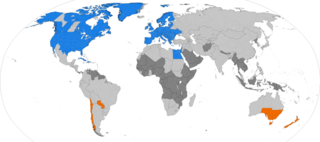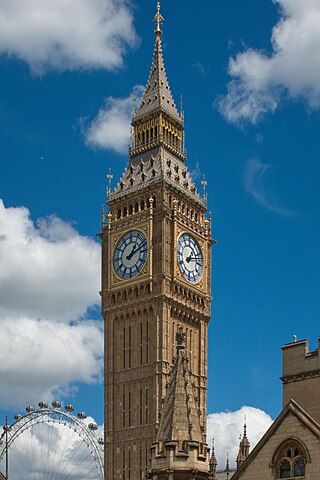2 in the Morning may refer to:
- 2 in the Morning (New Kids on the Block song), 2009
- 2 in the Morning (Girlicious song), 2010
- 2 in the morning, the time of the day which corresponds to 0200 in the 24-hour clock, see 12-hour clock
2 in the Morning may refer to:

An hour is a unit of time historically reckoned as 1⁄24 of a day and defined contemporarily as exactly 3,600 seconds (SI). There are 60 minutes in an hour, and 24 hours in a day.

Daylight saving time (DST), also referred to as daylight savings time, daylight time, or summer time, is the practice of advancing clocks during warmer months so that darkness falls at a later clock time. The typical implementation of DST is to set clocks forward by one hour in either the late winter or spring, and to set clocks back by one hour in the fall or autumn to return to standard time. As a result, there is one 23-hour day in early spring and one 25-hour day in the middle of autumn.

A circadian rhythm, or circadian cycle, is a natural oscillation that repeats roughly every 24 hours. Circadian rhythms can refer to any process that originates within an organism and responds to the environment. Circadian rhythms are regulated by a circadian clock whose primary function is to rhythmically co-ordinate biological processes so they occur at the correct time to maximise the fitness of an individual. Circadian rhythms have been widely observed in animals, plants, fungi and cyanobacteria and there is evidence that they evolved independently in each of these kingdoms of life.

H. R. Pufnstuf is an American children's television series created by Sid and Marty Krofft. It was the first independent live-action, life-sized-puppet program, following on from their work with Hanna-Barbera's program The Banana Splits Adventure Hour. The seventeen episodes were originally broadcast Saturday from September 6, 1969, to December 27, 1969. The broadcasts were successful enough that NBC kept it on the schedule as reruns until September 4, 1971. The show was shot at Paramount Studios and its opening was shot at Big Bear Lake, California. Reruns of the show returned on ABC Saturday morning from September 2, 1972, to September 8, 1973, and on Sunday mornings in some markets from September 16, 1973, to September 8, 1974. It was syndicated by itself from September 1974 to June 1978 and in a package with six other Krofft series under the banner Krofft Superstars from 1978 to 1985. Reruns of the show were featured on TV Land in 1999 as part of its Super Retrovision Saturdaze Saturday morning-related overnight prime programming block and in the summer of 2004 as part of its TV Land Kitschen weekend late-night prime programming block, and it was later shown on MeTV from 2014 until 2016.
The 12-hour clock is a time convention in which the 24 hours of the day are divided into two periods: a.m. and p.m.. Each period consists of 12 hours numbered: 12, 1, 2, 3, 4, 5, 6, 7, 8, 9, 10 and 11. The 12-hour clock was developed from the second millennium BC and reached its modern form in the 16th century.
The Westminster Quarters, from its use at the Palace of Westminster, is a melody used by a set of four quarter bells to mark each quarter-hour. It is also known as the Westminster Chimes, Cambridge Quarters or Cambridge Chimes from its place of origin, the Church of St Mary the Great, Cambridge.
The six-hour clock is a traditional timekeeping system used in the Thai and formerly the Lao language and the Khmer language, alongside the official 24-hour clock. Like other common systems, it counts twenty-four hours in a day, but divides the day into four quarters, counting six hours in each. The hours in each quarter are told with period-designating words or phrases, which are:

"Some Might Say" is a song by English rock band Oasis. It was released as the first single on 24 April 1995 from their second studio album, (What's the Story) Morning Glory? (1995). The song was written by the band's lead guitarist Noel Gallagher. "Some Might Say" provided Oasis with their first number one on the UK Singles Chart and reached the top 10 in Finland, Iceland, Ireland and Sweden. The song is also the last to feature all five original members, as original drummer Tony McCarroll was fired shortly after the song's release.

"Morning Glory" is a song by the English rock band Oasis, written by Noel Gallagher and released on the band's second album (What's the Story) Morning Glory? in September 1995. It was given a commercial single release only in Australia, New Zealand, and Japan, and it was also a radio single in the United States and Canada. In North America, it was the first song of the album to receive significant airplay, although primarily at alternative rock radio stations, as "Some Might Say" and "Roll with It" had not achieved as such.

During British Summer Time (BST), civil time in the United Kingdom is advanced one hour forward of Greenwich Mean Time (GMT), in effect changing the time zone from UTC±00:00 to UTC+01:00, so that mornings have one hour less daylight, and evenings one hour more.

"Grandfather's Clock" is a song written in 1876 by Henry Clay Work, the author of "Marching Through Georgia". It is a standard of British brass bands and colliery bands, and is also popular in bluegrass music. The Oxford English Dictionary says the song was the origin of the term "grandfather clock" for a longcase clock. In 1905, the earliest known recording of this song was performed by Harry Macdonough and the Haydn Quartet.
"In the Wee Small Hours of the Morning" is a 1955 popular song composed by David Mann, with lyrics by Bob Hilliard. It was introduced as the title track of Frank Sinatra's 1955 album In the Wee Small Hours.

The Elizabeth Tower is the clock tower of the Palace of Westminster in London, England. It contains the Great Clock, a striking clock with five bells. The tower is nicknamed "Big Ben", a name which was originally applied only to the largest bell of the clock. The tower was officially called the Clock Tower until 2012, when it was renamed to mark the Diamond Jubilee of Elizabeth II.
4 AM may refer to:
The Clock or The Clocks may refer to:
5 o'clock or five o'clock may refer to:
The morningness–eveningness questionnaire (MEQ) is a self-assessment questionnaire developed by researchers James A. Horne and Olov Östberg in 1976. Its main purpose is to measure whether a person's circadian rhythm produces peak alertness in the morning, in the evening, or in between. The original study showed that the subjective time of peak alertness correlates with the time of peak body temperature; morning types have an earlier temperature peak than evening types, with intermediate types having temperature peaks between the morning and evening chronotype groups. The MEQ is widely used in psychological and medical research and has been professionally cited more than 4,000 times.
2 A.M. may refer to:
5 A.M. may refer to:
11 A.M. is a time on the 12-hour clock.